God of War: Ascension – Review
by Keegan
|
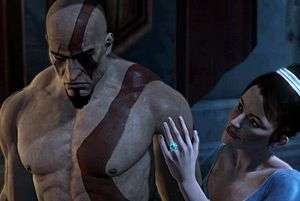 God of War: Ascension makes me a very angry man. It makes me angrier – much angrier – than any title I’ve played before… in fact, it turns out that every time I think about the fourth part of Kratos’ saga I quickly become rather irate. Ascension is a prologue, taking place before the events of the God of War Trilogy. This – it was said – would take players back to the very beginning of Kratos’ tale, outlining his back-story and explaining why he is such a very angry man. That, however, requires a narrative that makes sense, and unfortunately it takes a while for Ascension to really get into the swing of things as far as story is concerned.
God of War: Ascension makes me a very angry man. It makes me angrier – much angrier – than any title I’ve played before… in fact, it turns out that every time I think about the fourth part of Kratos’ saga I quickly become rather irate. Ascension is a prologue, taking place before the events of the God of War Trilogy. This – it was said – would take players back to the very beginning of Kratos’ tale, outlining his back-story and explaining why he is such a very angry man. That, however, requires a narrative that makes sense, and unfortunately it takes a while for Ascension to really get into the swing of things as far as story is concerned.
After a while it’s possible to piece together something that makes sense, but it is not simple. A great deal of the narrative assumes that you have prior knowledge of the series, and when you do not – like myself – there is little to explain his actions or what the blazes is actually going on. Illusions, changing time periods and poor pacing all make appearances, making it astonishingly difficult to keep track of what’s happening, who Kratos is meant to be fighting, why he is fighting them, or even where or when he is.
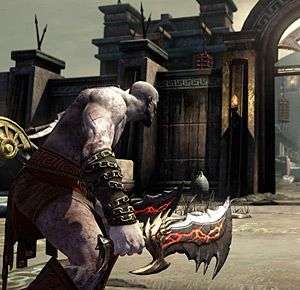 Though there is a need to tie the narrative into the later titles and create a story that makes sense when compared to them, the story feels like it has been forced into the mold, and suffers for it. The flaws are symptomatic of far more infuriating problems that contaminate Ascension all the way through the campaign. The worst of these, and by far the most infuriating element of any game I have played, is the inability to control my own camera. I realise that this is a feature shared with many older titles, but the vast majority of my gaming has been done in more recent years, and, as such I’m an entitled brat who likes being in control of his own camera. While this complete lack of control does set up some impressive cinematic moments in the middle of gameplay, it also makes it completely impossible to actually play. The camera is either zoomed all the way out – with Kratos a barely discernible speck in the distance – or it is in way too close, allowing Kratos to be attacked from off-screen.
Though there is a need to tie the narrative into the later titles and create a story that makes sense when compared to them, the story feels like it has been forced into the mold, and suffers for it. The flaws are symptomatic of far more infuriating problems that contaminate Ascension all the way through the campaign. The worst of these, and by far the most infuriating element of any game I have played, is the inability to control my own camera. I realise that this is a feature shared with many older titles, but the vast majority of my gaming has been done in more recent years, and, as such I’m an entitled brat who likes being in control of his own camera. While this complete lack of control does set up some impressive cinematic moments in the middle of gameplay, it also makes it completely impossible to actually play. The camera is either zoomed all the way out – with Kratos a barely discernible speck in the distance – or it is in way too close, allowing Kratos to be attacked from off-screen.
The art-style is impressive, and the design of many of the buildings and enemies is absolutely fantastic. Unfortunately, many of the early enemies are mutated humans who look quite a lot like Kratos, which might be understandable, but when combined with the autonomous camera it occasionally becomes nigh-impossible to distinguish him from the dozens of opponents that are flitting across the screen. All too often it feels like you’re fighting the game itself, rather than Kratos’ enemies. There is often a focus on ensuring that the scale of everything is huge and over the top, but even when the developers do succeed – and it has to be admitted that they do – it is often undermined by the gameplay itself.
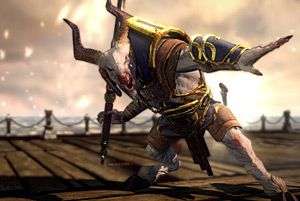 The focus in any hack and slash should be the combat, because that is where the foundations of enjoyment are laid. It’s all well and good to have a beautiful world like God of War’s Sparta, but if it’s no fun to play in then there’s no pleasure in it. Sadly, God of War’s combat is a mess. There really is no other word for it. Everything feels very sloppy, which is surprising when you consider they have had at least four chances to get the hang of it. Nevertheless, it is a simple system with just a few inputs that has somehow been turned into a confused wreck of invulnerabilities, hit-boxes and a dodge roll that doesn’t work.
The focus in any hack and slash should be the combat, because that is where the foundations of enjoyment are laid. It’s all well and good to have a beautiful world like God of War’s Sparta, but if it’s no fun to play in then there’s no pleasure in it. Sadly, God of War’s combat is a mess. There really is no other word for it. Everything feels very sloppy, which is surprising when you consider they have had at least four chances to get the hang of it. Nevertheless, it is a simple system with just a few inputs that has somehow been turned into a confused wreck of invulnerabilities, hit-boxes and a dodge roll that doesn’t work.
Kratos is equipped with a light and a strong attack, which are mapped to the square and triangle buttons respectively. Combining these inputs is meant to create some fairly flowing, high-impact combos; they’ve got the high impact part down – as every hit feels meaty – but combat is neither flowing nor responsive. Each input is followed by a brief pause before anything happens, which is just long enough to become incredibly annoying and allow enemies to hit you, especially if you are in mid-combo on another opponent. There is a dodge roll and a block function, neither of which are particularly helpful mid-combat as neither of them can be cancelled into. This means that once a combo has started – not a move, mind you – then you have to stop and wait a beat before your guard will go up or Kratos will begin dodging. This is remarkably annoying and leaves plenty of time to get beaten up. The net result of this is that you will likely spend a great deal of time using the grab function, which lets Kratos hang onto an enemy and hit them, or otherwise throw them about the place. It’s really the only effective method of crowd-control, so there is no other option if you want to stay alive, but it’s hardly enjoyable to play like that.
After a while you’ll also gain the ability to use magic granted to you by one of four deities: Ares, Poseidon, Zeus and Hades. Depending on which deity you have “equipped” (for lack of a better word) your fighting style will change, along with gaining some extra effects for your stronger attacks. Once you upgrade that particular magic enough you gain the ability to use it in an area-of-effect attack and a hugely powerful rage move, which you can only use when Kratos’ rage bar is filled (which is achieved by both hitting and avoiding being hit yourself, which can make it a mighty irritating proposition).
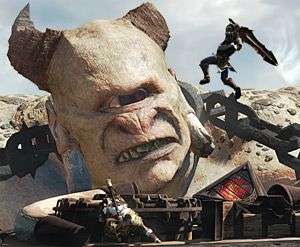 Occasionally, fights are remarkably unbalanced, throwing another layer of bitterness over what is not a particularly enjoyable experience in the first place. When you are having waves of boss creatures come at you without even the suggestion of getting life back at all between them, you really begin to notice the flaws in Ascension’s system. Battle through however, and you will be fortunate enough to experience a… rather dull and mechanical boss fight. Again, the emphasis is on making everything big and impressive rather than actually fun, and that comes through very clearly in the boss fights. The scale of them is magnificent, but that doesn’t change the fact that each of them is simply a three-part fight which, barring the size of the enemies, could potentially be taken from any other game.
Occasionally, fights are remarkably unbalanced, throwing another layer of bitterness over what is not a particularly enjoyable experience in the first place. When you are having waves of boss creatures come at you without even the suggestion of getting life back at all between them, you really begin to notice the flaws in Ascension’s system. Battle through however, and you will be fortunate enough to experience a… rather dull and mechanical boss fight. Again, the emphasis is on making everything big and impressive rather than actually fun, and that comes through very clearly in the boss fights. The scale of them is magnificent, but that doesn’t change the fact that each of them is simply a three-part fight which, barring the size of the enemies, could potentially be taken from any other game.
Of limited use in combat, but far more use in the less irritating platforming sections are the Amulet of Ouroborous, allowing Kratos to repair or degrade parts of the world in fairly awe-inspiring fashion, and a neat little trinket that allows him to be in two places at once for a brief moment in time. Don’t get too excited though, because his doppelganger does absolutely nothing. Still, it’s helpful in certain puzzling parts of Kratos’ journey, but again is a case of looking good but not doing all that much.
The multiplayer – the introduction of which was greeted with a mixture of shock, horror and a bit of confusion by the gaming community at large – is actually the single best feature of Ascension. I admit that I was sceptical going into it because I had already been driven mad by the single-player, but what I found was instead pleasantly surprising. I was also impressed by how it was tied into the single-player campaign, as it turns out that what seemed to be an inconsequential NPC character is in fact the player avatar. The first order of business is to choose a patron, one of four Gods who will influence the skills and abilities that your character will gain as it levels up, as well as changing how certain weapons look when wielded by that character. It’s actually a really nice system for customisation, and allows you to chop and change between patrons, changing character set-ups and load-outs at a moments notice.
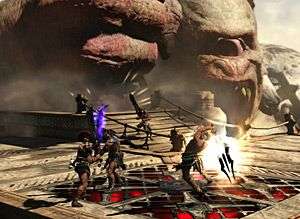 Gameplay itself is familiar, but not quite as sprawling as in the campaign. Each player wields one of three weapons: a sword, a spear or a hammer. Each of them plays differently, with spears being fast and fluid, giving the ability to string together combos quickly and effectively, while the hammer is a slow and brutishly powerful tool. The sword is a middle of the road weapon that deals more damage than the spear, but is faster than the hammer. These weapons have different power attacks, which can break guards and do massive amounts of damage, but after they are used they have to cool down, so they can’t be spammed endlessly, though they do link very nicely into other, less powerful combos.
Gameplay itself is familiar, but not quite as sprawling as in the campaign. Each player wields one of three weapons: a sword, a spear or a hammer. Each of them plays differently, with spears being fast and fluid, giving the ability to string together combos quickly and effectively, while the hammer is a slow and brutishly powerful tool. The sword is a middle of the road weapon that deals more damage than the spear, but is faster than the hammer. These weapons have different power attacks, which can break guards and do massive amounts of damage, but after they are used they have to cool down, so they can’t be spammed endlessly, though they do link very nicely into other, less powerful combos.
In addition to the hardware, each character also has a magic spell that they can use, the effect of which is determined by that player’s patron and an extra ability, again, determined by their God. Perhaps one of the most confusing elements of the multiplayer combat was the grab mechanic, which made use of the same chains that Kratos has, despite the fact that the multiplayer avatar shows no signs of actually having them. At random points in matches there is a possibility that a pick-up weapon could appear, which can be wielded as it is in the campaign, but unlike in Kratos’ journey these have a time limit, so for the most part it’s a case of “use it or lose it”.
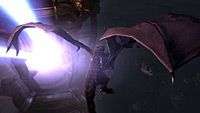 |
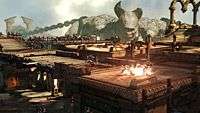 |
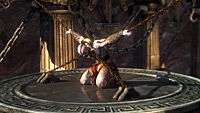 |
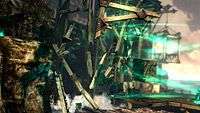 |
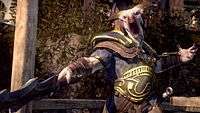 |
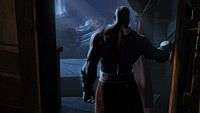 |
There are only a few types of online match: Team Favour of the Gods, Match of Champions, Trial of the Gods, and Capture the Flag. Each match type features plenty of stabbing and murder, but there are also different elements to keep each mode feeling fresh. Capture the Flag is self explanatory, and Match of Champions is essentially a deathmatch mode, but Trial of the Gods is similar to Horde mode from Gears of War, throwing waves of increasingly powerful enemies at teams of players, with each kill stopping the clock for a moment, so the faster you hand out death the more likely you are to succeed. However, the time limit is a little harsh, so you’d best be pretty good if you hope to snatch victory. The bulk of my time was spent playing Team Favour of the Gods – a mode best compared to Domination in the Call of Duty series (or so I’m told), and essentially a mode where territory control is key; you take control of altars, giving you points over time, while you gain more immediate points by killing members of the opposing team, with the first to the threshold winning.
Multiplayer maps are based on locations from throughout the series, and though I only recognised a few, it was clear that the scale of the locations were not only in keeping with the rest of the series but, at some points, were completely surpassing them. In order to accommodate more than one player the size of everything has increased, and it pays off with magnificent results. Unfortunately, the multiplayer quickly becomes somewhat uninteresting. By taking familiar modes and giving them a melee combat twist they are made easy to slip into and enjoy without much need for adjustment, but the flip-side of that is that they quickly become too familiar, and it soon loses its magic, becoming a bit of a grind. In addition, combat is badly balanced, with a clear tendency towards the higher-level players, as gear is unlocked at certain levels and is noticeably more powerful. I found this to be my downfall early on and benefit in the latter stages, but there is no denying that it is unbalanced.
The flaws in the multiplayer reflect the flaws in the campaign, and they all combine to make God of War: Ascension a rather frustrating experience. It looks good, damn good, and it is easy to be left in awe at the scale of the battles and environments that you see along the way. Unfortunately, the same seems to have happened to the developers, and when it comes to actually playing you’re left with a sloppy, infuriating mess. There are many things I like about the God of War universe – the mythology, the art styles, the architecture, the history – however, I don’t like Ascension. It has won one very small acclaim, however… it’s the only game to ever make me rage quit. And it did it more than once.
Pros- The scale is magnificent
- The multiplayer is fun for a while
- The combat is sloppy and badly implemented
- No control over your own camera
- Badly unbalanced fights
- Confusing and boring story
- Multiplayer is skewed towards experienced players
- Often feels like you’re fighting the game more than your enemies
Ultimately, God of War: Ascension is a fight against everything, the game included, and by the end you’ll be fighting boredom. Although there is an epic scale game to be found among the annoyances, it most certainly does not make this an experience worth having (and I could easily say the same about the multiplayer).
It might be worth a look in if you are desperate to know more about Kratos and how he came to be the man that he is now, but for those who can’t really bring themselves to care then my heartfelt advice is stay away. This is not fun. It’s not enjoyable. It might be pretty to look at, but it’s not worth actually playing.
Last five articles by Keegan
- I Heart... Quiplash
- What's a Blood Sport Without Personality?
- XCOM and the Art of Permanence
- Pokken Tournament - Review
- Failure to Launch

















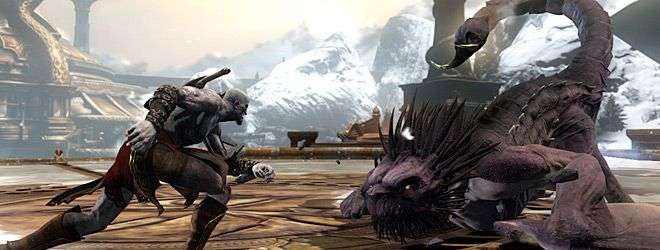
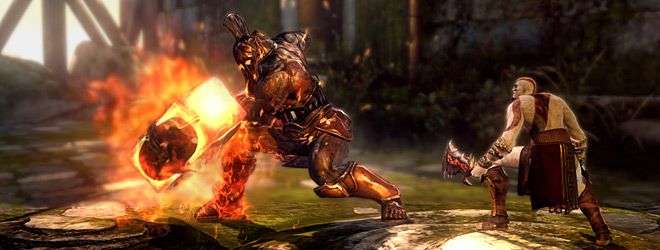
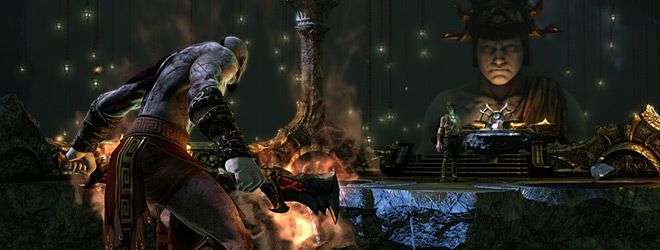






THIS game mage you ragequit? This was by far the easiest God of War game in the series. I got the platinum in 3 days time. I can tell from the way you describe the combat that you went into this title a novice in the series, and the fact that you think the “doppleganger” is only used for puzzle solving tells me you didn’t spend much time learning your powers/abilities. The “doppleganger” can be powered up via orb usage to be used as an attack, where he teleports from enemy to enemy stomping them to pieces. Its one of the best magic attacks for crowd control.
Next time you’re gonna review a game, I suggest you take the time to actually use the weapon/ability enhancement system instead of playing through the whole game using square-square-triangle.
Because if THIS game made you rage quit, you won’t even make it past the first level on any of the others in the series.
Of course they assumed the player had prior knowledge to the series going into this game, It’s a AAA series that every play station owner is familiar with. Go play the rest of the series then come back and give this game an adequate review, or give up on reviewing because this is the most amateur article I have ever read.
As Keegan’s flatmate I sat and watched him play much of this, and I’m inclined to agree. Yes I have played the previous games, and I still found this to be the worst in a pretty unremarkable series. If you do like it it’s fair enough but as someone who doesn’t like the franchise the fact that even I could see a visible downshift says something.
Furthermore you can’t expect people to have played every game in a series before reviewing the latest title, that’s just not possible time frame wise. Also, if people haven’t fully realised in game features, then doesn’t that suggest that they didn’t have enough attention drawn to them? Thus making it the fault of the developers?
At the end of the day, not everybody likes the same stuff, so quit hating.
And I thought I wasn’t too keen on it. The problem I had with it was, in terms of cinematic epicness, you just don’t get much better than God of War III, and Ascension failed to, ahem, ascend to new heights. I’d say you’ve come into the series at the wrong game so I’d suggest you check out the God of War HD Collection and God of War III. There’s still no control over the camera (it’s just that kind of game I’m afraid) but the action is framed much more spectacularly. Honestly, Ascension can’t hold a candle to the original trilogy, even the PS2 entries, which still hold up today, God of War II in particular.
While I don’t think a game should be heavily marked down if the player hasn’t played previous games in the series, it also shouldn’t assume that everyone playing the game has already done so. I’ve played the all of the previous games, with God of War II being my personal highlight. Overall I believe the series to be ‘Ok to good’ and none of them, for me at least, have been worth a score over an 8. I’d say the original two probably hit the 7/8 mark, but the third one, while graphically impressive, felt very much the same thing, over again.
I trust what Keegan is saying though, this looked just like God Of War III in my eyes, I really wouldn’t be able to tell the difference. We’re getting to a point in the industry, as a whole, where doing the same old bullshit, and pulling the same old stunts, isn’t going to cut it, because there is just too much competition and too much on offer.
Good review Keegan, and I say that, knowing you were 100% honest and gave a fair reflection of your opinion of the game.
Hahaha hello N4G readers. Still a bunch of quims then. Keegan has more reviewing talent than you’ve got snarling inbreds in your family tree.
I called this when I saw it at E3 during Sony’s conference and involuntarily yawned my entire way through the live demo.